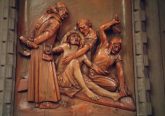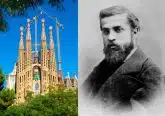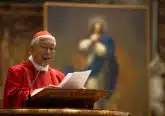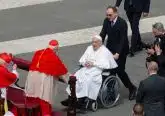Canon lawyer on Father Pavone’s dismissal from priesthood: Only the Pope can issue a decision without appeal
CNA Newsroom, Dec 18, 2022 / 19:20 pm
On Nov. 9, Cardinal Lazzaro You Heung Sik, prefect for the Vatican’s Dicastery for the Clergy, dismissed Father Frank Pavone from the priesthood for “blasphemous communications on social media” and “persistent disobedience of lawful instructions of his diocesan bishop.”
The decree, shared with U.S. bishops in a letter dated Dec. 13 written by the apostolic nuncio to the United States, Archbishop Christophe Pierre, precludes any possibility of appeal.
Pavone, 63, is the longtime national director of the pro-life organization Priests for Life who is well-known for his pro-life activism, politically charged social media posts, and public support of former president Donald Trump.
Pavone’s sudden laicization has shocked many Catholics and pro-life advocates. It also raises a host of still-unanswered questions about his case. Among them: What are the specific canonical crimes with which Pavone was charged? And when, and how, was he notified he is no longer a priest? Pavone, for his part, claims that he had no prior notification about the Vatican’s action until contacted by CNA on Dec. 17. Is this plausible?
To better understand the Church laws and judicial processes involved in cases such as this, CNA sought the expertise of Father Gerald E. Murray, a canon lawyer and the pastor of Holy Family Church in New York City who is a regular contributor to EWTN’s “The World Over with Raymond Arroyo.”
What is the typical process for these types of accusations?
Ordinarily, it is the responsibility of the bishop of the diocese in which the accused priest is incardinated to investigate accusations of “blasphemous communications on social media” and “persistent disobedience of lawful instructions of his diocesan bishop,” which are the two reasons given for Father Pavone’s dismissal from the clerical state in a communication sent to the bishops of the United States by Archbishop Pierre.
The diocesan bishop, if he finds that a priest is guilty of such offenses, would then refer the matter to the Holy See if he judged that the penalty of removal from the clerical state was the appropriate punishment. The diocesan bishop cannot on his own authority dismiss a priest of his diocese from the clerical state.
Furthermore, the Code of Canon Law does not state that the possible penalties for these two offenses include dismissal from the clerical state. Canon 1368 states that a person who utters blasphemy is to be “punished with a just penalty.” Canon 1371 states that “a person who does not obey the lawful command” of his Ordinary “and after being warned, persists in disobedience, is to be punished, according to the gravity of the case, with a censure or deprivation of office or with other penalties mentioned in can 1336, 2-4.” Canon 1336, 5, which is not included in the scope of punishments for a violation of canon 1371, mentions dismissal from the clerical state.
Thus, imposing dismissal from the clerical state for these offenses would require what happened in this case, that is, the issuance of what Archbishop Christophe Pierre (the apostolic nuncio to the United States) identified as a “Supreme Decision admitting of no possibility of appeal.” Only the Pope, who enjoys “full and supreme power in the Church” (canon 332, 1), can issue such a decision against which there is no possible appeal.
When is the defendant normally informed?
Ordinarily, the priest who has received such a penalty is informed in a timely fashion. It would be interesting to know if and when Father Pavone received a copy of the decree in which the Supreme Decision was handed down and to see if the decree further specified the grounds upon which a decision was reached that he was guilty of blasphemy and disobedience. Father Pavone has been quoted as saying that he only learned of this decision, which Archbishop Pierre wrote was dated Nov. 9, 2022, when CNA contacted him on Dec. 17, 2022.
What happens if the laicized priest persists in celebrating the sacraments, especially Mass?
A laicized priest is forbidden to celebrate the sacraments, with the exception of hearing confessions and absolving a sinner in danger of death (canon 976). Any other sacramental celebration is unlawful and thus an act of disobedience.
How unusual is Pavone’s case?
I am aware of the case of a priest in France who was dismissed from the clerical state in the recent past in part because of disobedience to his bishop.
What could constitute “blasphemy on social media”? Has this type of charge ever been noted before?
The “Modern Catholic Dictionary” by Father John Hardon, SJ, defines blasphemy as: “Speaking against God in a contemptuous, scornful, or abusive manner. Serious contemptuous ridicule of the saints, sacred objects, or of persons consecrated to God is also blasphemous because God is indirectly attacked.” It would have been helpful if the incidents in which such blasphemy was committed were identified, along with the evidence that Father Pavone refused to retract such blasphemies when informed that he was being prosecuted for this canonical crime. I have not heard of another recent case of dismissal from the clerical state because of blasphemy.
As noted above, blasphemy and disobedience are not punishable in the Code of Canon Law by dismissal from the clerical state. Thus priests who are found guilty of committing such acts presumably do not expect to receive such a punishment. When they are first accused of such canonical offenses, there will likely be a dispute as to whether their acts in fact constitute blasphemy or disobedience. Since the Holy See has chosen to impose this punishment that goes beyond what is foreseen in the Code of Canon Law, it would have been incumbent upon the diocesan bishop and the Holy See to warn Father Pavone that, if found guilty, he would face such a punishment that went beyond the provisions of the Code.













